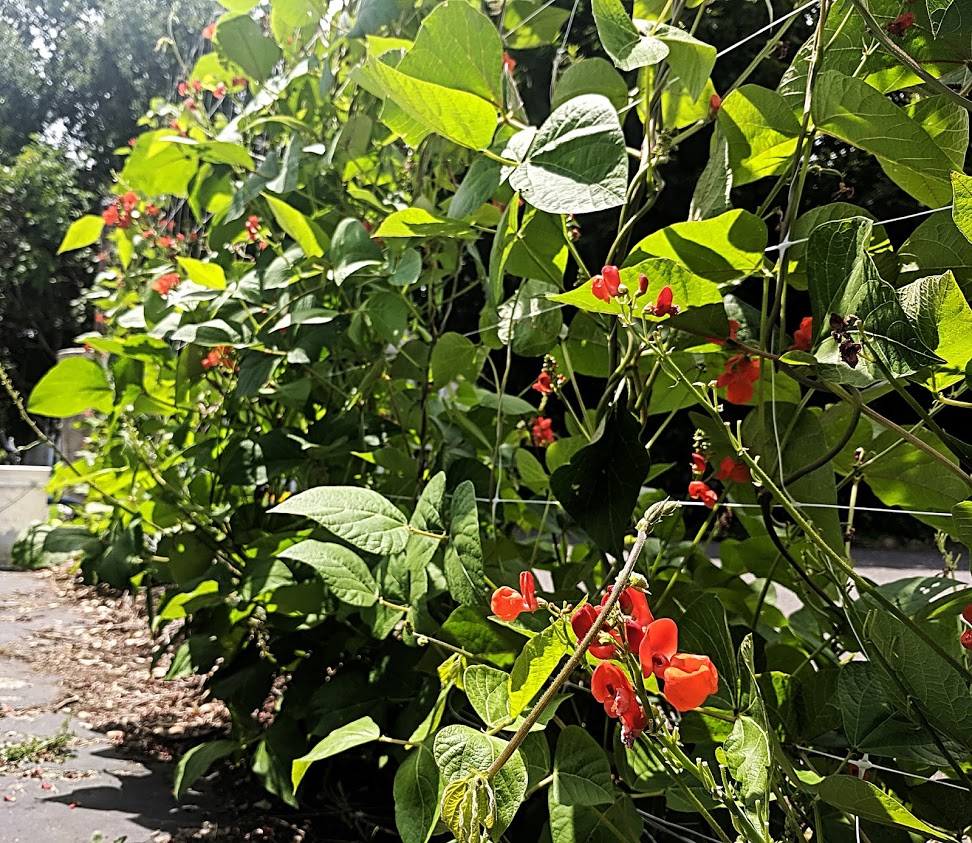Why you should grow scarlet runner beans, and also another gardening metaphor
You all know how much I love my gardening metaphors, right? You've heard me talk about how my ongoing battle against Bermuda grass parallels the important work of social justice advocacy--constant, slow work marked by small steps and the absolute guarantee of no end or victory in sight. Maybe you've seen my photos of hard-pruned plants sprouting delicate new growth, reminding all of us that starting over is always possible. Whenever I see a seed set just above the ground cracking open to release a pale shoot uncurling above it, I think about how finding my way to the life I wanted meant breaking open the self I thought I was, exploding completely out of old structures so that the parts of me that know how to look for the sun could find it.
This weekend I spent time tending to our driveway-long bed of scarlet runner beans. Have you seen these beans? They are a really good reason to have a garden.
First the vines put out bright red trumpet-shaped flowers, beloved by hummingbirds and bees.
Then there are delicate filet green beans, crisp-tender and sweet. If those don't get picked, they become thicker beans, that can be sliced finely and sauteed or opened and cooked like lima beans.
Finally the pods dry and split to reveal speckled pink and red beans that cook up in a rich broth and, I'm told, make a better cassoulet than the traditional Tarbais bean.
Last year's beans, tucked under their safe cover of rich compost, gave up their forms and became graceful vines, twisting around the trellis Adam put up last year, climbing up and up and up according to the unwavering religion of all pole bean vines. Some of the vines reach out into the road, ready to catch whatever might be passing by--a rolling tire, the edge of my skirt. So the work, then, of the observant gardener, is to encourage those wayward vines back onto the trellis.
Here’s a photo from last year, in which Kamal, in heroic gardening garb, carefully watered the newly-emerged baby bean vines.
This is tricky work. Some vines aren't long enough yet to be tucked safely into the trellis. Some of them want to go left even though the open spot on the trellis is to the right. If you try to force a vine, you might break it. If you leave a vine stretching out onto the road, it might get run over. For the vines' safety and their well-being, for the blossoms and beans I want, I can't have them broken. I can't have them smushed, either.
This is the work of the observant parent, too, isn't it? We do our best to steer our children away from harm, but we have to do it gently, lest we become the harm. We coax them towards the path we think makes it easiest for them to grow. Sometimes they want to go a different way, and then it's on us to adjust, to grow gentler instead of more forceful.
And really, it's the work of the growing and forgiving self. Because we haven't stopped growing, ever; because we are always reaching for light; because sometimes even when we're on what feels like the right path, we have to move to another one. We make mistakes. We disappoint ourselves. We lose our connection to our roots or we lose sight of the sunlight.
And all we need to do, then, is adjust. Just a tiny shift is enough to begin; trying to force big changes all at once might end up actually slowing down our growth. When we find ourselves in a place of overwhelm, of exhaustion, of stasis; when the same challenges and frustrations pile higher and higher all around us--we start making small steps. For instance: waking up a few minutes earlier so there's time to meditate; getting a bigger glass so we drink enough water; stepping into a yoga class and committing to stay till the end even if we're in child's pose the whole damn time. Forgiving our worst crimes against ourselves and committing to repairing them, however many there are, however long it takes.
When we see ourselves winding wide of our right path, there's no way back to it except the way back to it. There's no faster way than one foot in front of the other. It's not always clear; it's rarely as straightforward as we'd like. But if we can be as gentle with ourselves as we know the tender vines of early summer require, the way starts to show itself. If we can grant ourselves patience, and love, and forgiveness--one day at a time, one breath at a time--then maybe we look up one day and there's the sun, big and bright and right there over our heads.








